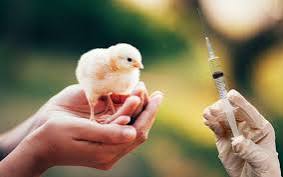Vaccines work by introducing a small, harmless piece of a disease-causing agent (antigen) to the body, which triggers the immune system to produce antibodies and immune cells that can recognize and fight the disease.
Here are various possible outcomes of vaccinating birds:
Positive Outcomes:
– Immunity to specific diseases
– Reduced disease transmission
– Improved bird health and well-being
– Increased productivity and egg production
– Enhanced immune system response
– Reduced antibiotic use
– Protection against zoonotic diseases
READ ALSO: Vaccine Failure in Poultry
Negative Outcomes:
– Adverse reactions (allergic reactions)
– Vaccine failure or ineffectiveness (most times due to temperature fluctuations during storage, which is common in areas with poor power supply/lack of back-up power supply).
– Stress and discomfort during vaccination
– Vaccine contamination or improper handling
– Vaccine-induced immunosuppression
– Interaction with other health issues or medications
– Cost and logistical challenges
READ ALSO:Antibiotic Resistance in Poultry (Cause and Prevention)
Neutral Outcomes:
– No noticeable effect on bird health or productivity
– No change in disease susceptibility or transmission
– No adverse reactions or interactions
Rare Outcomes:
– Vaccine-associated diseases (e.g., Marek’s disease)
– Autoimmune disorders
– Tumors or cacance
It’s crucial to consult with a veterinarian to determine the best vaccination program for your specific flock and monitor for any outcomes.
READ ALSO: Nutritional Deficiency in Poultry
What are vaccines made from:
– Weakened or killed forms of the disease-causing agent
– Genetic material (DNA or RNA)
– Subunits of the disease-causing agent, such as proteins or sugars
– Inactivated toxins
By stimulating the immune system, vaccines help protect against infectious diseases, reducing the risk of illness, complications, and transmission.
Connect with other farmers and get yourself updated by clicking Here to join our WhatsApp group



